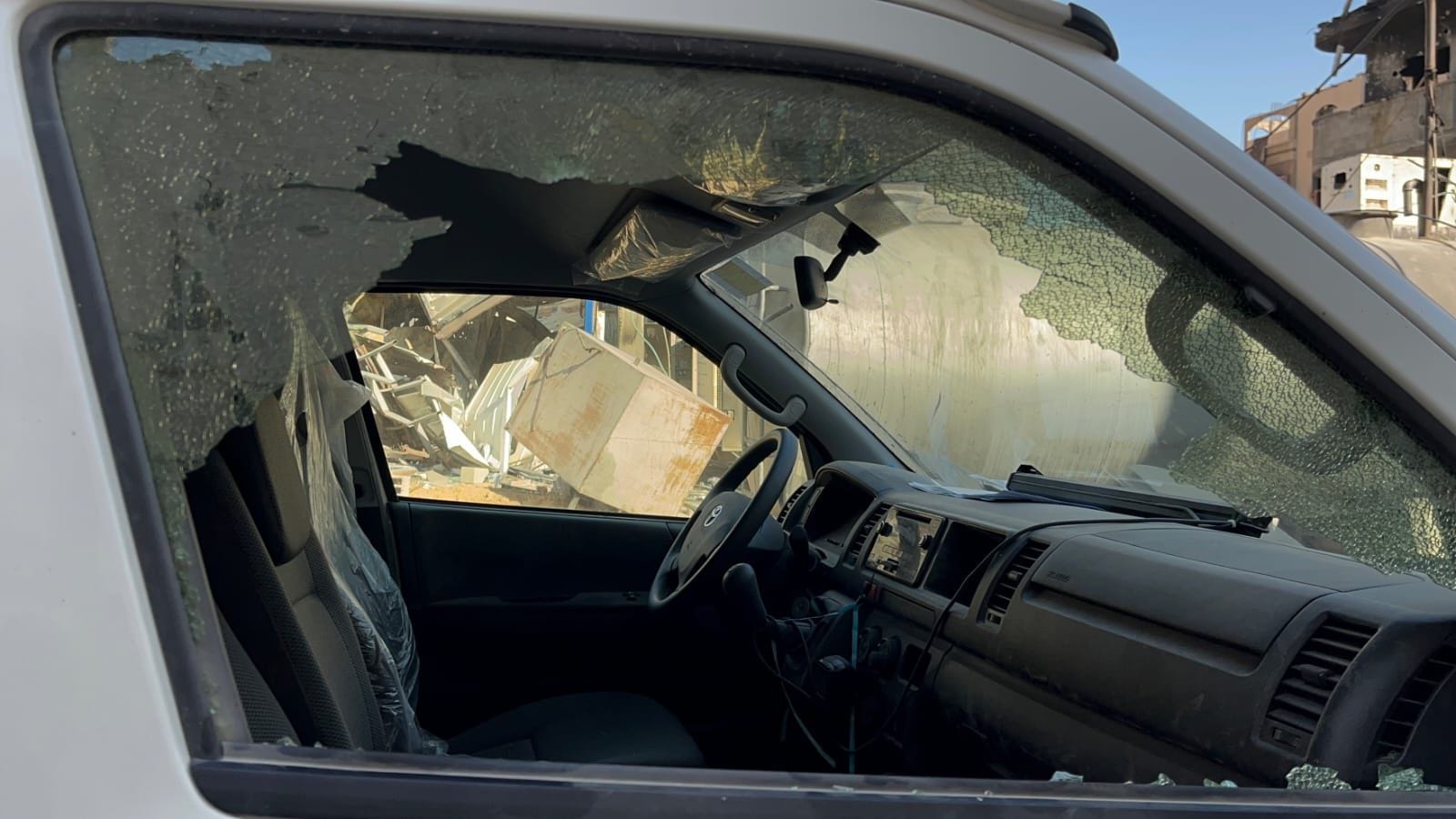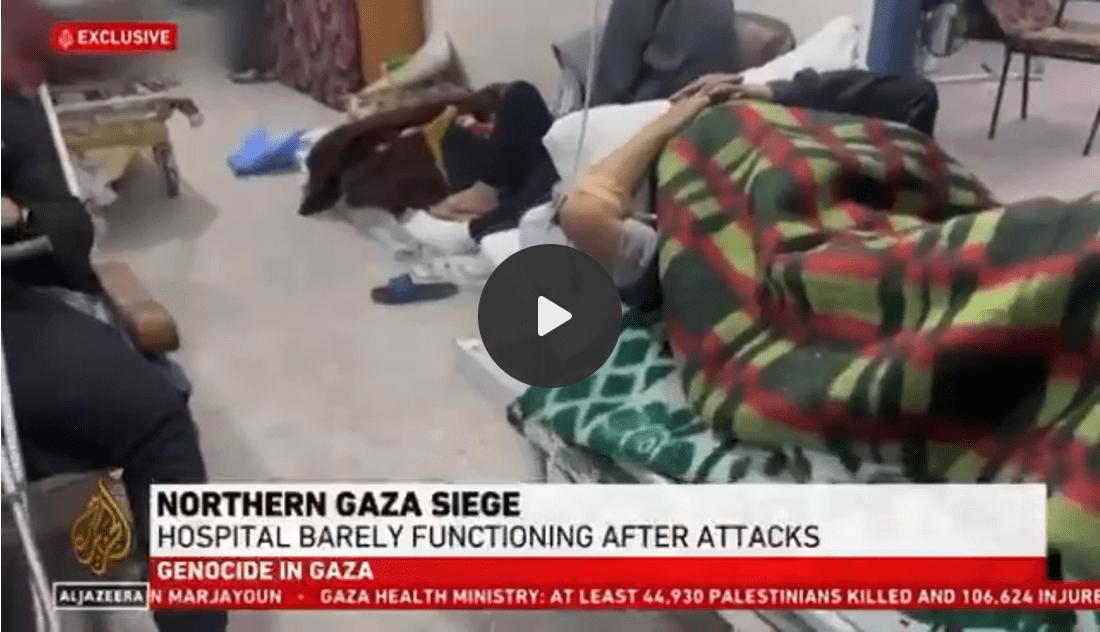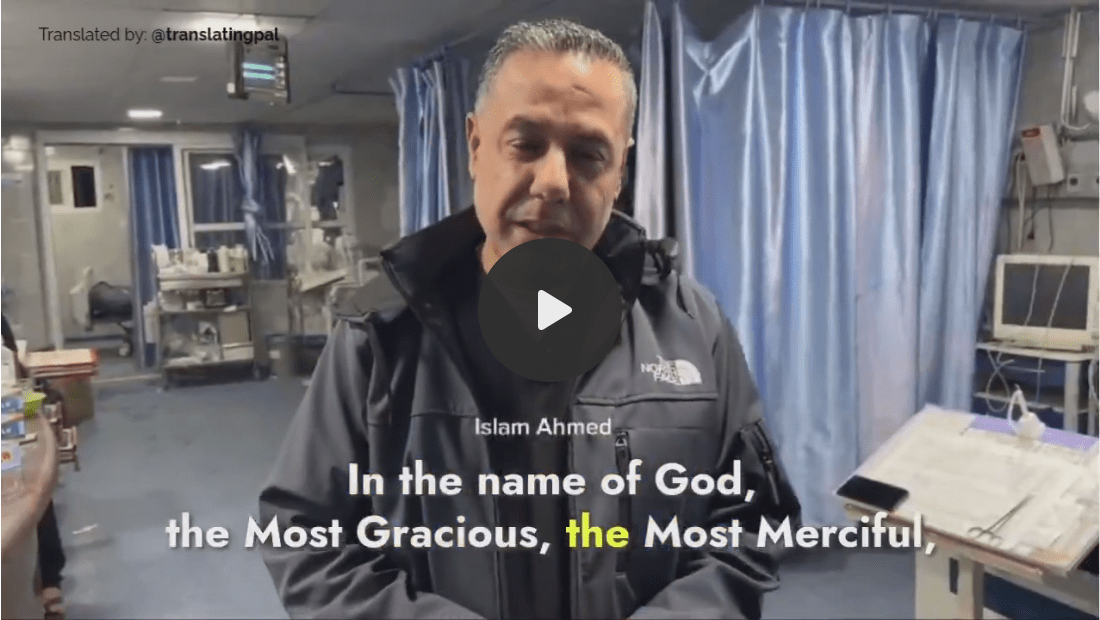|
The Last Two Weeks Have Been the Most Dire in Gaza War: Hospital Director
Kamal Adwan Hospital in northern Gaza "will turn into a graveyard for everyone inside" amid ongoing Israeli attacks
Drop Site News is making an impact—and it's all thanks to you, our readers.
We've grown to 8,230 paid subscribers, but we need to reach 9,000 by month's end to hit our goal and sustain our investigative reporting in the upcoming year. Our work is 100% reader-funded. No ads. No corporate backing. Just independent journalism that makes those abusing power uncomfortable.
If you value our reporting and have the means, please consider upgrading to a paid subscription. You can also make a tax-deductible donation here. Your support directly funds our newsroom and keeps our journalism free from outside influence.
 Two paramedics who arrived to assist at Kamal Adwan Hospital yesterday were injured by Israeli forces / Hussam Abu Safiya
Two paramedics who arrived to assist at Kamal Adwan Hospital yesterday were injured by Israeli forces / Hussam Abu SafiyaSince the beginning of October, all three remaining hospitals in northern Gaza have endured relentless military attacks by Israel. Only three healthcare facilities in northern Gaza remain “minimally functional,” according to the World Health Organization, including the Indonesian, Al-Awda, and Kamal Adwan Hospitals.
As Israeli forces have laid siege to large swathes of the region, Kamal Adwan and its neighborhood have become symbols of Palestinian resistance. How much longer it can withstand Israel’s assault is unclear. Without immediate intervention, “the hospital will turn into ruins,” Hussam Abu Safiya, a physician and the director of Kamal Adwan Hospital, told Drop Site News.
More than 4,000 Palestinians have been killed or reported missing since October 5 and over 12,000 people have been injured, according to a spokesperson for Gaza’s Civil Defense services, Gaza’s primary rescue agency. The humanitarian crisis continues to deepen as access to food, water, and medical supplies remains almost nonexistent. Repeated Israeli attacks had rendered Gaza’s civil defense services completely inoperable by October 23, making rescue efforts virtually impossible. On November 26, Gaza’s civil defense services reported receiving more than 2,600 calls from people trapped under rubble across northern Gaza. But their ambulances and firetrucks have all been destroyed, preventing emergency workers from reaching them—meaning that many of those trapped have likely suffocated.
On December 1, Israeli airstrikes destroyed five residential buildings near Kamal Adwan, killing nearly all of the 200 civilians—including children—who lived inside. Four days later on December 5, the hospital was bombed again, injuring 12 civilians, including staff. Among the dead were 16-year-old Mahmoud Abu Al-Eish, a wheelchair-bound patient, and his caregiver, who were hit near the X-ray department.
The next day saw one of the deadliest attacks on the hospital, with Israeli airstrikes killing at least 29 people, including four medical staffers, and wounding dozens. The assault also displaced dozens of civilians seeking refuge at the hospital. Four medical staff members were killed. This was part of a larger assault on the hospital and its surroundings.
In a message to Drop Site News, Abu Safiya reported seeing “hundreds of bodies” scattered just beyond the hospital grounds, with dozens of new injuries overwhelming the already devastated medical team. Despite these catastrophic losses, surviving staff members refused to leave their posts.
The next week on December 12, three more medical staff members were injured in yet another bombardment of Kamal Adwan. And three days later, Saeed Jouda, an orthopedic surgeon, was killed by a direct shot to the head after an Israeli quadcopter drone targeted him en route to assist critical patients at neighboring Al-Awda Hospital. Kareem Jalladat, the hospital’s charge nurse, was struck by a reconnaissance missile.
According to the Palestinian Ministry of Health, 1,057 healthcare workers have been killed in Gaza since the war began, underscoring the unprecedented toll on the region’s already fragile medical system. Dismantling this system is a key piece of the so-called “Generals’ Plan” to ethnically cleanse the area of the 65,000 to 75,000 Palestinians who remain trapped under increasingly inhumane conditions.
Despite these attacks, Kamal Adwan continues to operate under unimaginable conditions. Abu Safiya has endured deeply personal losses, including the death of his son in an Israeli drone attack on the hospital in October. On November 24, he suffered a leg injury that landed him in intensive care. Three days later, he was back on his feet treating patients, using a cane to help him walk.
His continued presence at the hospital reflects the desperation and resilience of its remaining staff.
Drop Site News has been in close contact with Abu Safiya, who shared critical updates about the deteriorating conditions at the hospital over the weekend. We are publishing his messages in full below, with the local times and dates noted. Though Drop Site News is unable to verify each detail, Dr. Abu Safiya’s messages are an important and powerful record of Israel's war on Gaza.
Saturday, December 14, 11 a.m.
It was another difficult night for Kamal Adwan Hospital. The use of explosive robots is something new to us, and they are getting closer to the hospital every day. Three explosive robots detonated yesterday, breaking the doors and windows of patients’ rooms. The sound was terrifying, and this has, unfortunately, become our daily routine.
In addition to the artillery shelling and bombings from quadcopters, about five bombs were dropped on the generator unit and the oxygen supply network, causing further damage.
Today, after coordination, the repair and maintenance team from the Ministry of Health arrived. Six patients have been transferred from our hospital, and the World Health Organization brought a small amount of fuel, supplies, medical tools, and some food vouchers.
Unfortunately, the Indonesian medical delegation that was supposed to stay at Kamal Adwan Hospital was sent back.
We evacuated the most critical cases that required urgent surgical intervention. Currently, approximately 60 injured individuals remain at Kamal Adwan Hospital, most of whom also need surgical procedures. We are awaiting the return of the Ministry of Health delegation tomorrow to transfer more cases requiring surgical intervention, as Kamal Adwan Hospital lacks surgical specialties.
The supplies we received are in very limited quantities, but a little is better than none.
We have been demanding international intervention to protect the healthcare system, its workers, and the patients within it from the bombings that are perilously close to Kamal Adwan Hospital, including drone attacks that have damaged our water, oxygen, air, and electricity systems.
The situation remains extremely dire. We work under constant fear, amid bombings, terror, and the relentless dropping of explosives, all under very challenging conditions.
We hope that our plea will be heard after more than 70 days of aggression against our presence in the healthcare system in the northern Gaza Strip.
Around 0:45, a bombing during the unloading of an aid delivery breaks hospital windows / Al Jazeera
Sunday, December 15, 10 p.m.
What is happening at Kamal Adwan Hospital is yet another dark day in the long history of suffering that the facility endures daily.
Since yesterday until now, the bombing and targeting continue around the clock.
The quadcopters are targeting generators 24 hours a day, continuously hitting essential infrastructure. They are targeting the water supply, the oxygen station, and everyone working in the vicinity, particularly those areas that support the hospital.
Today, all four generators were targeted, leading to significant damage. Unfortunately, anyone attempting to repair anything is also directly targeted by the quadcopters, which are dropping bombs on them.
There was coordination for the entry of vehicles from the Palestinian Ministry of Health to evacuate some cases and bring in supplies. However, the patients inside the ambulances were targeted by the drone bombs. Two ambulance drivers were moderately injured, and one of the patients, who was already injured and hospitalized, was also affected. Additionally, one worker who was helping transfer cases to the ambulance was injured.
As of now, the targeting has not stopped. We do not understand the reason behind this violent assault. The hospital is being directly attacked, despite our plea to the world that we need international protection for the health system and its workers for over seventy days.
Unfortunately, there has been no response or positive action regarding the protection of our health services. We are being killed daily in the hospital, and we are currently facing direct bombardment without any prior notice. We have no electricity, no water, and no oxygen.
I currently have more than fifty patients hospitalized inside the facility. Many of these patients are in intensive care and need oxygen, electricity, and water continuously.
We are facing extremely difficult days and even hours ahead. Without a quick and urgent solution to bring in the necessary supplies to repair what has been damaged by the quadcopters, the situation will worsen.
Moreover, when the northern gate was targeted, there were numerous casualties who were transferred to the hospital, and there are still martyrs present at the northern gate. We cannot retrieve or evacuate them for fear of continuous targeting of anyone moving within the area.
The situation is dire in every sense of the word. We have appealed to the world and continue to demand international protection for the health system workers at Kamal Adwan Hospital.
Monday, December 16, 4 p.m.
Unfortunately, since yesterday until now, we have faced the same scene: the same bombings and violent targeting against Kamal Adwan Hospital.
What was new yesterday was the arrival of ambulances that were coordinated through the DCO, but there were attempts to target these ambulances, resulting in the wounding of two paramedics and disabling three out of four ambulances. Three of them are completely out of commission and are currently stranded in the streets.
What made yesterday particularly alarming was that, for the first time, the intensive care department was targeted by snipers, and all the windows of the hospital were hit. This indicates that the snipers are positioned at high points. Anyone moving within the hospital wards was at risk of being shot, creating a very dangerous situation for both patients and staff.
 |
Since yesterday, we have been providing medical care for some individuals in the corridors.
From morning until now, the bombing has resumed, impacting the hospital buildings, its surroundings, and the courtyard. It is evident that the focus is on the hospital—its structure, its vicinity, and anyone moving within it.
Since yesterday, we have received about 29 injuries and five martyrs.
There are urgent maintenance needs, such as repairs to generators, electricity, water, and oxygen supplies. Unfortunately, we cannot go out to fix the damage caused by the attacks yesterday and today.
We are currently enduring difficult hours without electricity, oxygen, or water. The situation in the hospital is becoming increasingly dire and will turn into a graveyard for everyone inside.
We are appealing to the world for help. We urgently call for international protection for the healthcare system and its workers.
As of now, we have not received any guarantees or promises from anyone to intervene and protect the healthcare system.
This lack of support is why we find ourselves alone in this situation. We see no one in the world standing by our side, despite the claims of humanity and democracy. What crime has a hospital committed while providing humanitarian services to injured women and children? We are being targeted in this manner without anyone intervening or condemning these actions.
Unfortunately, there has been no denunciation or commitment to halt these barbaric and inhuman attacks.
Hussam Abu Safiya, in a video from December 16. It shows damage to Kamal Adwan Hospital, where Israeli snipers targeted staff inside northern Gaza’s only ICU. Israel also bombed the hospital’s generators, cutting electricity entirely, while drone strikes continue to hit its yard, windows, and gates / @translatingpal
Herman Gill is a writer for Drop Site News, where he manages and creates social media content. His work focuses on foreign affairs, with a particular emphasis on the Middle East.



No comments:
Post a Comment
Note: Only a member of this blog may post a comment.